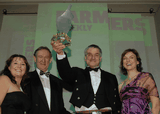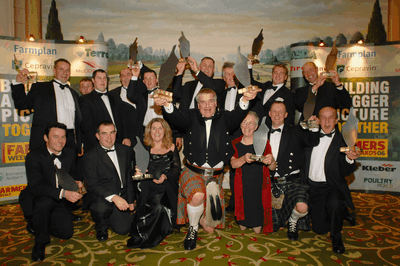Best of British farming celebrated in the Farmers Weekly Awards


- Visit the Farming Awards Mini-site
Hertfordshire grower Robert Law is the 2006 Farmers Weekly Farmer of the Year.
At a glittering ceremony last night (30 November) at Grosvenor House, Park Lane, London, over 500 people saw Robert, along with ten other category winners collect their awards which recognise the very best in British agriculture.
Commenting on his achievement, Farmers Weekly editor Jane King said: “He’s truly a determined farmer who combines a thriving business with a passion for the countryside and promoting farming to the public.”
Presenting Robert with his trophy, government farming adviser Sir Don Curry added: “Robert is a man who is the face of modern farming – a highly skilled business manager with a talent to make new ideas fly. This is a committed environmental manager, who appreciates the value of communication.”
Find out why the judges chose Mr Law as their outright winner
Read Features Editor David Cousin’s experiences of the night
* * * * * *
If you ever doubt the optimism in British farming, look no further than the fantastic line-up of winners and runners up in the 2006 Farmers Weekly Awards.
This year’s scheme has delivered a showcase of British agriculture at its best, with farmers who are forward-looking, entrepreneurial, adaptable and, most importantly, profitable.


* * * * * *
Robert Law – Farmers Weekly Farmer of the Year
Here’s why Robert won:
Farming has a future and it is a profitable future, provided farmers respond to public calls for wildlife stewardship, countryside access and farm products tailored to their needs.
That’s the mantra of Hertfordshire farmer Robert Law, this year’s Farmers Weekly Farmer of the Year. It has served him well, taking him from zero to hero in 25 years.
With no prior farming history to influence his thinking Robert has created a profitable arable and sheep enterprise just outside Royston almost from a standing start.
Hard work and an ability to make the most of opportunities as they arise have seen him use a combination of share-farming, partnerships, renting and buying to convert £15,000 of his own capital into a business that now spans 1200ha in Hertfordshire and a further 500ha in Nottinghamshire.
“Applying outside thinking is important,” he admits. “Being a first generation farmer makes me more of a risk taker, with no older generation to talk down proposed changes.”
Innovation has been a cornerstone of his farm plan. “It’s not about running a Quad-trac and trying to grow wheat and rape as cheaply as possible.” Instead, Conservation Grade grain for local breakfast cereal and snack maker Jordans earns him premiums of £5-8/t, more than offsetting higher production costs.
What’s more, the wildlife management required by Jordans is a revenue stream in its own right, with Countryside Stewardship and ELS adding almost £80,000 to farm income.
Robert’s close involvement in policy through DEFRA and NFU committees means his wildlife areas deliver real benefits, not just a box-ticking opportunity. Counts by RSPB volunteers reveal increased bird numbers, for example.
Superb business skills mean every aspect of Thrift Farm is fully costed, right down to achieving a five-year payback on 2,000t of beet quota bought in 2002. Most of the 4000t of cereals produced each year is harvested by one combine and a significant proportion is grown on multi-year contracts, helping reduce business risk.
Block cropping and prudent planning ensure workloads are spread to cut overheads and inputs are used judiciously, with GPS-guided applications taking account of huge variations in nutrient reserves, for example.
Seizing opportunities to maximise profit is a key theme.
A 2000-ewe flock producing lamb for direct sale locally adds significant value by grazing crop aftermaths, particularly forage crops grown for seed, and local grass, including an SSSI.
Boundless energy, unbridled enthusiasm and a true trust in his staff make the farm a hive of innovation. Everyone is salaried and there are no time sheets. “It is really important – it means they are part of the business and can be left to get on with operations, so I can focus on managing the business. That’s far better use of my time.”
Robert firmly believes everyone in the industry needs to promote farming. He has 10km of signed permissive access, runs regular farm walks, talks to groups ranging from schools to politicians to the WI, and is a regular commentator in the local press, radio and TV.
“I like to keep busy, the busier I am the better,” he notes. That’s just as well. To remain profitable the business will need to change in line with the growing importance of environmental schemes and biofuels, and declining role of conventional food cropping, he predicts.
Farming needs inspirational thinkers with the business drive to generate worthwhile results. Robert is just such an individual, he is the best of British farming.
The Farmers Weekly Awards The theme for this year has been about building a bigger picture together with our sponsors. Our aim is to identify excellence in farm businesses and share the knowledge and learning from their enterprise.
Interest in the Awards has been so great that we have expanded to include two new categories – the McCormick Farm Manager of the Year and the NFU Farming Champion of the Year. The latter is all about the importance of communication and education to the public and we are extremely pleased to be working with the NFU in this critical area.
A big thank you to all our sponsors for their enthusiasm and commitment to these awards and to the independent judges who spent a very hot summer out and about in the field with our short-listed farmers.
Selecting the winners was extremely tough given the array and quality of entries. In reality, all finalists are winners by demonstrating technical and business superiority in a rapidly changing marketplace.
If you’re gearing up for change on your farm in 2007 or are simply inspired by this year’s winners, make sure you put yourself on the map and enter the 2007 Farmers Weekly Awards. |
|---|

